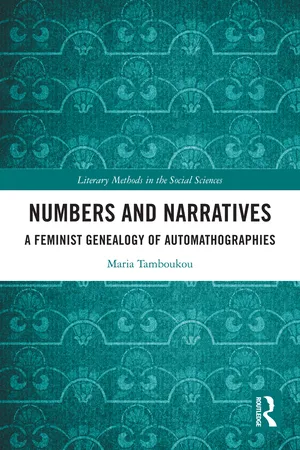
- English
- ePUB (mobile friendly)
- Available on iOS & Android
About this book
Why have there been so few women mathematicians? This book does not seek an answer in absence but in the forces, ruptures, and intensities that shape the becoming of a femme philosophe—a mathematician, scientist, and philosopher—within the shifting assemblages of eighteenth- and nineteenth-century Europe. Moving beyond exclusion as mere negation, it traces the conditions of emergence, the differential speeds and slippages through which women entered, inhabited, and transformed the mathematical sciences.
Drawing on auto/biographical documents, literary and philosophical writings, and the materialities of the archive, this book approaches the digital turn not as a tool but as a plane of composition, where new trajectories of memory work unfold. Between historiography and fabulation, it maps a space where women's mathematical thought was not only possible but inevitable—if only in flashes, excesses, and détours.
This book will resonate with scholars in the sociology, history, and philosophy of science and mathematics, particularly those engaged with feminist thought, the politics of knowledge, and experimental archival methods.
Frequently asked questions
- Essential is ideal for learners and professionals who enjoy exploring a wide range of subjects. Access the Essential Library with 800,000+ trusted titles and best-sellers across business, personal growth, and the humanities. Includes unlimited reading time and Standard Read Aloud voice.
- Complete: Perfect for advanced learners and researchers needing full, unrestricted access. Unlock 1.4M+ books across hundreds of subjects, including academic and specialized titles. The Complete Plan also includes advanced features like Premium Read Aloud and Research Assistant.
Please note we cannot support devices running on iOS 13 and Android 7 or earlier. Learn more about using the app.
Information
Table of contents
- Cover
- Half-Title
- Series
- Title
- Copyright
- Dedication
- Contents
- Acknowledgements
- Introduction: Becoming a Mathematician, Philosopher, and Scientist
- 1 Memory Machines and Archival Traces
- 2 Epistolary Entanglements: Between the Personal and the Scientific
- 3 The Dynamics and Politics of Translation
- 4 Exceptional Women? The Agonistics of Knowledge
- 5 Love and Mathematics: Existential Choices and Intellectual Freedom
- 6 Philosophical Ruminations and Process Epistemologies
- 7 Narrative Rhythmanalysis: Listening to the Echo of the Subject
- Conclusion: Future Pasts: Charting Assemblages
- Index